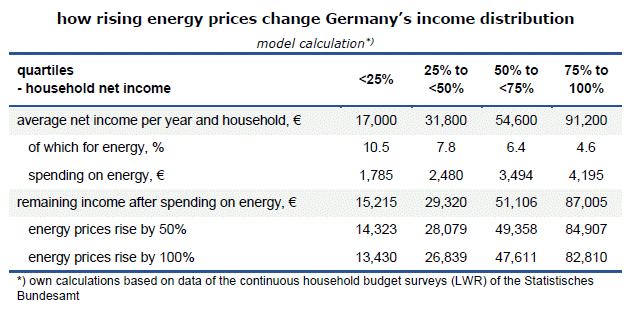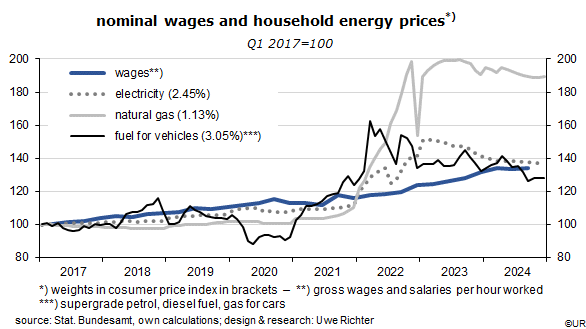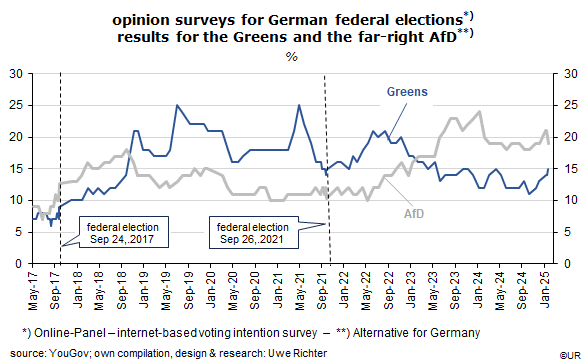
Market Commentary: High energy prices are effective, but hurt the poorer part of the population
Germany’s policy of high energy prices has significantly contributed to the reduction of CO2 emissions and the improvement of the environment. Even so, it is still a long road toward climate neutrality – on a per capita basis, emissions remain above the global average. This is why the prices for natural gas, electricity and gasoline have to rise further. There are other instruments that could be used to reduce emissions, but the price mechanism is probably the most effective one.
The problem is that the reliance on higher energy prices will make the income distribution – which is already quite uneven – even more so. Poor households are affected more than rich households. In relative terms they are spending more than twice as much on energy than the better-off.

In my model, which is probably close to reality, the households in the upper quartile of the income distribution earn on average 5.4 times as much as those in the bottom quartile – after adjusting for spending on energy, they make 5.7 times as much. Under the assumption that the volume of demand for energy will not change if its prices rise a lot, the ratio increases further: to 5.9 times after a 50% energy price inflation between now and then, and to 6.2 times if prices go up by 100%. Household incomes in the lower quartile would approach subsistence levels. For society, this would be a catastrophe. To avoid such an outcome, counter measures are needed.
For almost two years, from early 2021 to the end of 2022, prices for natural gas, gasoline and electricity had almost exploded. The situation has normalized since, but today‘s price levels remain a lot higher than before 2021

Not surprisingly, the poorer households suffered most. As a result of those high energy prices, their post-energy income had shrunk significantly, and they have mostly blamed the Greens, members of the three-party coalition government which has been in charge of federal policies since late 2021. Many have defected to the anti-immigration xenophobic AfD, the so-called Alternative for Germany. The Greens were clearly taken by surprise. The AfD doesn’t care much, or not at all, about climate policies (like, incidentally, the supporters of Donald Trump).

It is very difficult these days to sell climate policies without an effective social component. In economic theory, the easiest solution would be to redistribute all further government revenues from energy taxes and fees back to the population, preferably on a per-capita basis. This would be the so-called climate bonus. The regressive effects of energy taxes would be compensated, perhaps even more than that, by the progressive effects of such a redistribution. Beneficiaries would be people who don’t drive a car, or live in a care institution, or large families.
But this is not the only feasible solution to the negative social side effects of rising energy prices. In our well-developed social system, there are lots of suitable instruments which could be deployed without delay to provide social justice. People must see that climate policies are not just a financial burden but that there is a compensation in the form of social transfers to their household budgets. Poor people in particular could be the beneficiaries. This has to be clearly communicated. I hope it is not yet too late.
About Wermuth Asset Management
Wermuth Asset Management (WAM) is a Family Office which also acts as a BAFIN-regulated investment consultant.
The company specializes in climate impact investments across all asset classes, with a focus on EU “exponential organizations” as defined by Singularity University, i.e., companies which solve a major problem of humanity profitably and can grow exponentially. Through private equity, listed assets, infrastructure and real assets, the company invests through its own funds and third-party funds. WAM adheres to the UN Principles of Responsible Investing (UNPRI) and UN Compact and is a member of the Institutional Investor Group on Climate Change (IIGCC), the Global Impact Investing Network (GIIN) and the Divest-Invest Movement.
Jochen Wermuth founded WAM in 1999. He is a German climate impact investor who served on the steering committee of “Europeans for Divest Invest”. As of June 2017, he was also a member of the investment strategy committee for the EUR 24 billion German Sovereign Wealth Fund (KENFO).
Legal Disclaimer
The information contained in this document is for informational purposes only and does not constitute investment advice. The opinions and valuations contained in this document are subject to change and reflect the viewpoint of Wermuth Asset Management in the current economic environment. No liability is assumed for the accuracy and completeness of the information. Past performance is not a reliable indication of current or future developments. The financial instruments mentioned are for illustrative purposes only and should not be construed as a direct offer or investment recommendation or advice. The securities listed have been selected from the universe of securities covered by the portfolio managers to assist the reader in better understanding the issues presented and do not necessarily form part of any portfolio or constitute recommendations by the portfolio managers. There is no guarantee that forecasts will occur.
Read the full article in PDF format here: English.